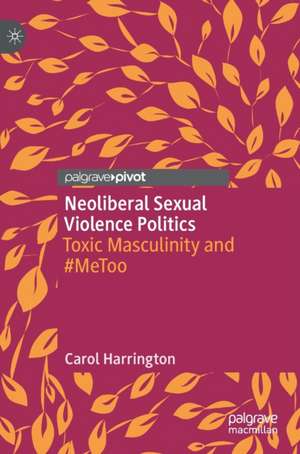Neoliberal Sexual Violence Politics: Toxic Masculinity and #MeToo
Autor Carol Harringtonen Limba Engleză Hardback – iul 2022
This book will be of interest to scholars whose research focuses on sexual violence, feminist studies, masculinity studies, and neoliberalism.
Preț: 383.12 lei
Nou
Puncte Express: 575
Preț estimativ în valută:
73.31€ • 76.54$ • 60.67£
73.31€ • 76.54$ • 60.67£
Carte tipărită la comandă
Livrare economică 04-18 aprilie
Preluare comenzi: 021 569.72.76
Specificații
ISBN-13: 9783031070877
ISBN-10: 3031070879
Pagini: 111
Ilustrații: IX, 111 p.
Dimensiuni: 148 x 210 x 15 mm
Greutate: 0.3 kg
Ediția:1st ed. 2022
Editura: Springer International Publishing
Colecția Palgrave Macmillan
Locul publicării:Cham, Switzerland
ISBN-10: 3031070879
Pagini: 111
Ilustrații: IX, 111 p.
Dimensiuni: 148 x 210 x 15 mm
Greutate: 0.3 kg
Ediția:1st ed. 2022
Editura: Springer International Publishing
Colecția Palgrave Macmillan
Locul publicării:Cham, Switzerland
Cuprins
Chapter 1: Introduction.- Chapter 2: Neoliberal Political Rationality and Sexual Violence.- Chapter 3: Toxic Masculinity.- Chapter 4: Problematizing Masculinized Work Cultures and Gender Inequality.- Chapter 5: Conclusion.
Notă biografică
Carol Harrington is Senior Lecturer in the School of Social and Cultural Studies, Victoria University of Wellington, New Zealand. She researches sexual violence politics. She has published on sexual violence in international politics; peacekeeper sexual violence; sex work knowledge politics in Sweden, the United Kingdom, and New Zealand; and social media narratives about sexual violence.
Textul de pe ultima copertă
This book locates #MeToo’s traction among elites with “womenomics” theories that attribute feminized poverty, welfare dependency, and sexual violence to traditional femininity and toxic masculinity. Such neoliberal anti-sexual violence policies seek to empower women through paid work and reform men through fatherhood. This volume shows that men’s movements and conservative concerns about “fatherless families” developed toxic masculinity discourse before popular feminism incorporated it. It analyses how discourse on #MeToo issues in the workplace reveals a shift away from representations of women as traumatized victims in need of empowerment toward a focus on men as both problem and solution, setting new standards for masculine workplace conduct. However, this discourse reproduces a toxic/good men binary that serves to consolidate a new form of hegemonic masculinity. The book concludes that neoliberal sexual violence politics obscures how globalization fosters inequalities and sexual violence by blaming these and other social ills on toxically masculine men.
This book will be of interest to scholars whose research focuses on sexual violence, feminist studies, masculinity studies, and neoliberalism.
Caracteristici
Offers critical interrogation of 'toxic masculinity' in feminist scholarship Uniquely contextualizes #MeToo within the landscape of neoliberal gender politics Draws on sociology to examine the global impact of neoliberal political rationality on sexual violence policies
